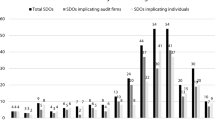Abstract
In the wake of the Enron and Andersen scandals, Congress passed the Sarbanes–Oxley Act of 2002, Section 201 of which was aimed at ending the practice of auditing firms providing consulting services to their clients. The Security and Exchange Commission's (SEC's) Final Rules on Section 201 are less definitive than the Act itself on what constitutes non-audit services and effectively delegate the implementation of Section 201 to the audit committee. The underlying problem with the objective of Section 201 — to put in place a barrier between auditing and consulting — is the restriction that it places on the extent to which an auditor can transfer to the client information obtained in the course of the audit without crossing the line of subsequently auditing its own work. Restricting such informational transfers raises the question of whether the anomalies detected in an audit can be corrected without duplication of effort and higher societal costs. Another important, although perhaps unintended consequence of Section 201, is the constraint that it may impose on the development of future audit methodologies, such as Continuous Auditing. This paper begins the process of providing an understanding of the tradeoffs that audit committees will have to manage in implementing Section 201 in the current legal and regulatory environment. Audit committees can perceive the responsibility that Section 201 imposes on them as a burden or, instead, as a source of discretion that can be exploited in the best interests of the business. Achieving the latter outcome requires the audit committee to develop a systematic principles-based approach that takes both the independence and informational aspects of the audit/consulting continuum into account.
Similar content being viewed by others
Author information
Authors and Affiliations
Corresponding author
Additional information
1Professor, Department of Accounting and Information Systems, Rutgers Business School; Visiting Fellow at Melbourne Business School.
2Professor at Rutgers University.
3KPMG Peat Marwick Professor of AIS, Rutgers University.
Rights and permissions
About this article
Cite this article
Alles, M., Kogan, A. & Vasarhelyi, M. Implications of Section 201 of the Sarbanes–Oxley Act: The role of the audit committee in managing the informational costs of the restriction on auditors engaging in consulting. Int J Discl Gov 2, 9–26 (2005). https://doi.org/10.1057/palgrave.jdg.2040040
Received:
Published:
Issue Date:
DOI: https://doi.org/10.1057/palgrave.jdg.2040040




